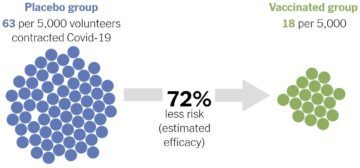Carl Zimmer and Keith Collins in the New York Times:
 Efficacy is a crucial concept in vaccine trials, but it’s also a tricky one. If a vaccine has an efficacy of, say, 95 percent, that doesn’t mean that 5 percent of people who receive that vaccine will get Covid-19. And just because one vaccine ends up with a higher efficacy estimate than another in trials doesn’t necessarily mean it’s superior. Here’s why.
Efficacy is a crucial concept in vaccine trials, but it’s also a tricky one. If a vaccine has an efficacy of, say, 95 percent, that doesn’t mean that 5 percent of people who receive that vaccine will get Covid-19. And just because one vaccine ends up with a higher efficacy estimate than another in trials doesn’t necessarily mean it’s superior. Here’s why.
For statisticians, efficacy is a measurement of how much a vaccine lowers the risk of an outcome. For example, Johnson & Johnson observed how many people who received a vaccine nevertheless got Covid-19. Then they compared that to how many people contracted Covid-19 after receiving a placebo.
The difference in risk can be calculated as a percentage. Zero percent means that vaccinated people are at as much risk as people who got the placebo. A hundred percent means that the risk was entirely eliminated by the vaccine.
More here.
